Can bearded dragons eat eggs? Many owners ask this when they want to offer their reptile a new, protein-rich treat. Eggs are easy to prepare and packed with nutrients. But that doesn’t always mean they’re safe.
This guide covers everything you need to know about feeding eggs to bearded dragons. You’ll learn the benefits, the risks, how to cook them properly, and how often to serve them.
So if you’re wondering, “Can bearded dragons eat eggs as part of a balanced diet?” — you’re in the right place. Let’s break it down and see when eggs make a smart, simple, and satisfying choice for your bearded dragon.
Are Eggs Safe for Bearded Dragons to Eat?
Can bearded dragons eat eggs safely? The answer is yes—but only in moderation and with the right preparation. Eggs can offer valuable nutrients, but they also carry some risks if overfed.
Understanding a Bearded Dragon’s Omnivorous Diet
Bearded dragons are omnivores, which means they eat both plant and animal-based foods. Insects make up the primary source of protein in their diet, while leafy greens and vegetables provide essential fiber, vitamins, and minerals. Occasionally, small portions of animal protein like eggs can be introduced as a treat—but not as a staple.
Nutritional Value of Eggs: What’s Inside?
Eggs contain high levels of protein, healthy fats, and a variety of nutrients such as vitamin A, B12, iron, and selenium. For humans, that’s a balanced package. For bearded dragons, however, it’s a bit much—especially the fat and protein. They don’t need as much of these nutrients as mammals do, which is why moderation is key.
Risks of Feeding Eggs: Too Much Protein or Fat?
Too much protein can lead to obesity, kidney strain, or digestive issues in bearded dragons. Similarly, excessive fat may cause long-term health problems. Eggs should never replace insects like crickets or roaches, which provide more appropriate nutrition for reptiles. Feeding eggs too often can throw off their natural dietary balance.
What Vets and Experts Say About Eggs for Reptiles
Reptile veterinarians generally agree that eggs are safe—occasionally. Most experts recommend offering eggs only once every couple of weeks and in very small portions. Always consult with a vet before adding new foods to your dragon’s diet, especially animal-based proteins like eggs.
How to Prepare Eggs for Your Bearded Dragon
Not all egg preparations are safe for reptiles. The way you cook and serve eggs matters just as much as how often you offer them. Let’s explore the safest methods to keep your bearded dragon healthy and satisfied.
Scrambled vs. Boiled: Which Is Best?
Both scrambled and boiled eggs can be safe if they are fully cooked and served plain. However, scrambled eggs are easier to chew and digest, especially when cooked without oil or butter. Boiled eggs are also fine, but be sure to chop them into small pieces to prevent choking.
Can Bearded Dragons Eat Egg Whites or Yolks Only?
Egg whites are mostly protein, while the yolk contains fat and most of the vitamins. Both parts are safe in small amounts. However, feeding only whites may lack nutrients, and feeding only yolks can lead to high fat intake. The best option is to feed a small mix of both, ensuring balance.
Safe Cooking Methods and Seasoning Rules
Never use oil, salt, butter, or any kind of seasoning when cooking eggs for your bearded dragon. Even trace amounts of additives can be harmful to reptiles. Stick to plain, fully cooked eggs with no added ingredients. Simplicity is safest.
Raw Eggs and Reptile Digestion: Why It’s a No-Go
Raw eggs are a definite no. They may carry harmful bacteria like Salmonella and are also harder to digest. In addition, raw egg whites contain avidin, a protein that blocks biotin absorption. Cooking eggs neutralizes these risks and makes the nutrients more accessible for your beardie.
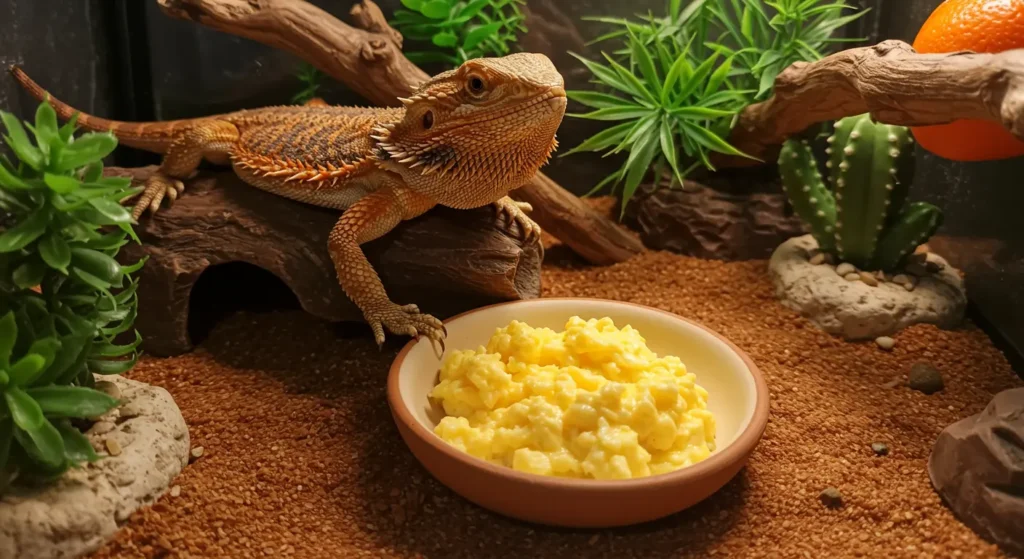
Portion Sizes and Frequency: How Much Egg Is Too Much?
Even healthy foods can become harmful if fed too often or in the wrong amounts. Eggs should always be treated as an occasional supplement—not a regular part of your bearded dragon’s weekly menu.
How Often Should Eggs Be Offered?
Most experts recommend feeding eggs to adult bearded dragons no more than once every two to three weeks. For younger dragons still growing, protein is important—but eggs should still be limited. Insects like dubia roaches or crickets are far better sources of protein for regular feedings.
Ideal Serving Sizes by Age and Size
A small piece about the size of your dragon’s eye is usually enough. For adult dragons, one-quarter to one-half of a scrambled egg is plenty. Never feed a whole egg at once. Younger dragons should get even less, as their digestive systems are still developing.
Balancing Animal Protein with Insects and Greens
Eggs should never replace staple foods like insects and greens. Bearded dragons need a well-rounded diet that includes daily servings of leafy vegetables and routine insect feedings. Use eggs as a protein boost—not a main course.
Signs Your Dragon Might Be Getting Too Much Protein
If your bearded dragon becomes sluggish, gains weight rapidly, or shows signs of digestive issues, you might be overfeeding protein. Cut back immediately and return to a basic diet of greens and gut-loaded insects. Always watch for changes in behavior or bowel movements after feeding new foods like eggs.
Veggies Your Dragon Will Love
Leafy greens like collard, mustard, and dandelion are some of the best vegetables you can offer. Other safe veggies include bell peppers, squash, carrots, and green beans. As for fruits, try berries, apples (without seeds), melons, and mango in small amounts. These provide vitamins and hydration, but remember—fruits should make up less than 10% of the total diet.
Animal-Based Proteins: Are They All Safe?
Besides eggs, some owners consider feeding cooked meats or fish. While small amounts of unseasoned chicken or turkey may be tolerated, they aren’t ideal. Insects such as dubia roaches, crickets, and silkworms are far better sources of protein. Stick with reptile-approved options to avoid complications with digestion or nutrient overload.
Dangerous Foods to Avoid at All Costs
Certain human foods are toxic to bearded dragons. Never feed them avocado, onions, garlic, dairy products, chocolate, or anything seasoned. Also avoid citrus fruits like oranges or lemons. These can cause stomach upset, calcium binding, or worse. Always research before offering any new food.
How Eggs Compare to Other Treats in Nutrition
Compared to fruits and some soft veggies, eggs are much higher in protein and fat. That makes them more of a “protein treat” rather than a regular staple. They lack the fiber and hydration that come from plants, so balance is key. Eggs can be helpful for boosting nutrition occasionally—but they should never replace greens or insects.
Can Bearded Dragons Eat Eggs as Part of a Balanced Diet?
Can bearded dragons eat eggs as part of a balanced diet? Yes—but it’s all about frequency, portion control, and variety. When used correctly, eggs can complement your dragon’s meals without disrupting their health.
Protein, Calcium, and the Phosphorus Factor
Bearded dragons need a calcium-to-phosphorus ratio of around 2:1. Eggs contain phosphorus and some calcium, but not enough to meet daily needs. That’s why it’s important to dust insects with calcium powder and prioritize leafy greens. Too much phosphorus can block calcium absorption, leading to metabolic bone disease (MBD).
Sample Weekly Feeding Plan with Occasional Eggs
Here’s a quick guide:
- Daily: Leafy greens and safe vegetables
- 2–3 times/week: Gut-loaded insects
- Once every 2–3 weeks: A small portion of scrambled or boiled egg
- Rarely: Fruit as a treat
Keep meals varied and monitor your dragon’s weight and activity levels.
Tips for Creating a Diverse and Satisfying Diet
A healthy diet should include a mix of protein, greens, and the occasional treat. Rotate vegetables weekly, use different feeder insects, and offer enrichment foods like flowers (hibiscus, nasturtium). This keeps your dragon excited and supports long-term health. Eggs can be part of this plan, but only in rotation with other foods.
When to Skip Eggs: Situations That Require Caution
Avoid eggs entirely if your bearded dragon is overweight, recovering from illness, or prone to kidney issues. Also, young dragons need more insect protein and may not benefit much from eggs. In these cases, stick to species-specific foods recommended by your reptile vet. Always observe your pet after trying new foods.
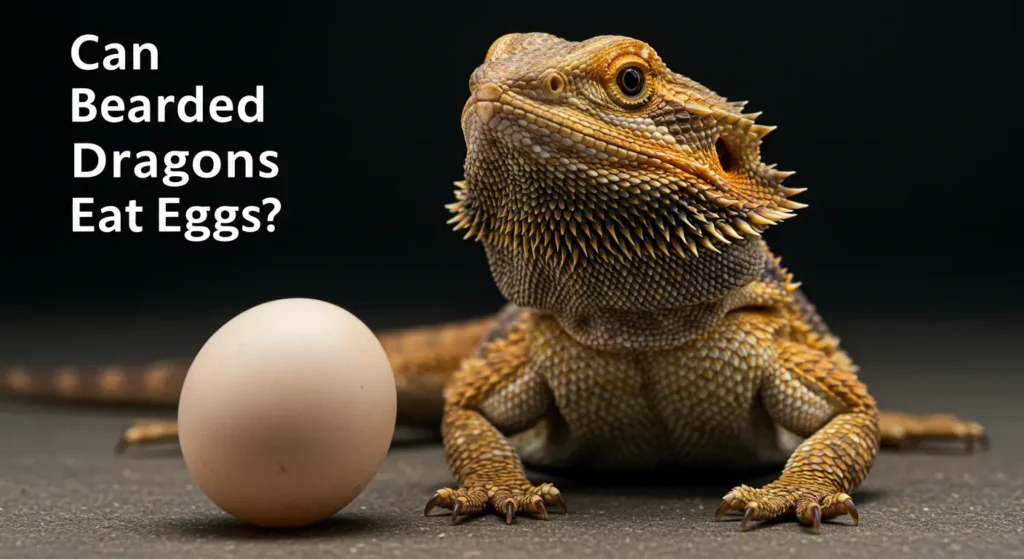
Conclusion: Can Bearded Dragons Eat Eggs Safely?
Can bearded dragons eat eggs? Yes, they can—when served properly and in moderation. Eggs offer valuable protein and nutrients, but they’re not a staple. Instead, think of them as an occasional treat that complements a well-balanced diet built on leafy greens, safe vegetables, and live insects.
As a responsible beardie owner, your job is to provide variety without overloading your pet with unnecessary fat or protein. Scrambled or boiled eggs—served plain, in small portions, and only every few weeks—can be a safe, satisfying addition to their menu.
When in doubt, consult a reptile-savvy veterinarian and always monitor how your bearded dragon responds to new foods. A thoughtful feeding routine leads to a healthier, happier dragon.

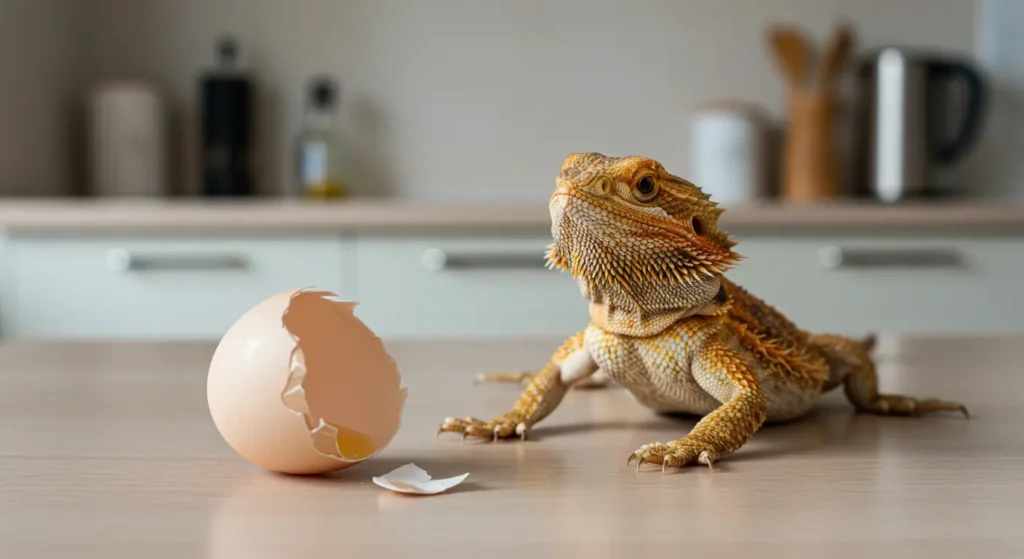

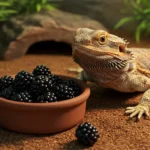
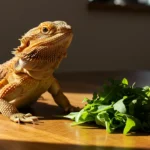

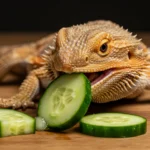
2 thoughts on “Can Bearded Dragons Eat Eggs? Safe, Simple, and Satisfying”